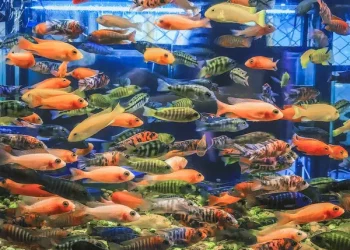Lungfish, also known as salamanderfish or bichir, are a unique and ancient species of fish that have been around for over 380 million years. They are able to breathe air through their lungs and survive in low-oxygen environments, making them adaptable to living both in and out of water. However, while they are able to survive out of water for short periods of time, it is not recommended to keep them out of water for prolonged periods as it can be harmful to their health.
One of the most remarkable features of lungfish is their ability to breathe air through their lungs. This is an adaptation that allows them to survive in stagnant, oxygen-poor water, where other fish would struggle to breathe. When water levels drop or the water becomes stagnant, lungfish can emerge from the water and breathe air through their lungs. This adaptation has allowed lungfish to survive in some of the most inhospitable environments on earth.
While lungfish can survive out of water for short periods of time, they are still primarily aquatic creatures and need to live in water to survive long term. When kept in captivity, it is important to provide them with an appropriate environment that mimics their natural habitat. This includes a large tank with plenty of swimming space and hiding places, as well as clean, oxygenated water.
It is also important to provide lungfish with a varied and balanced diet. In the wild, they eat a variety of prey, including small fish, insects, and crustaceans. In captivity, they can be fed a diet of pellets, freeze-dried foods, and live or frozen foods. It is important to avoid overfeeding them, as this can lead to health problems such as obesity and organ failure.
In conclusion, while lungfish are able to survive out of water for short periods of time, they are primarily aquatic creatures and need to live in water to survive long term. It is important to provide them with a suitable environment and a varied and balanced diet to ensure their health and well-being. If you are interested in keeping a lungfish as a pet, it is important to do your research and consult with an experienced fish keeper to ensure that you are providing the best possible care for your pet.


























